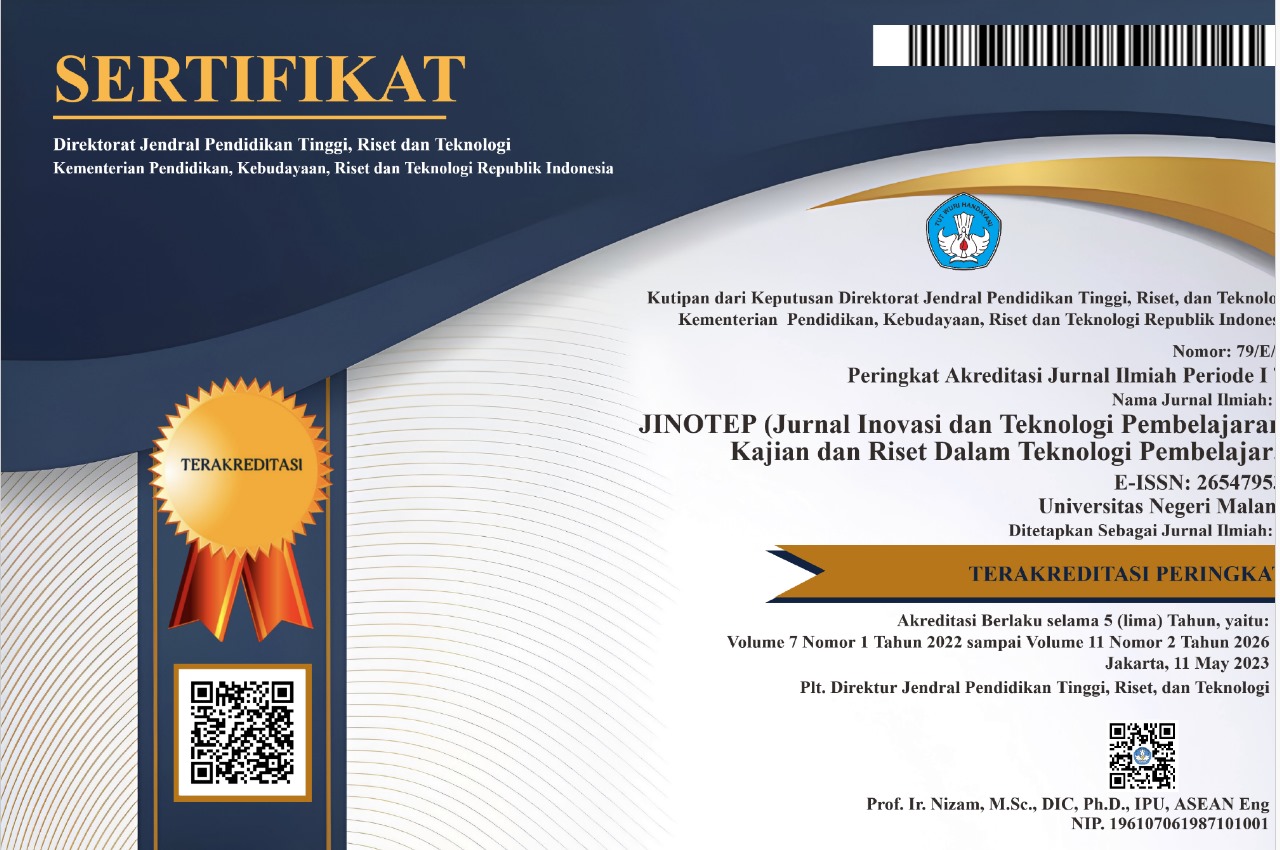Pengaruh Pemberian Psikoedukasi Piawai Bergawai untuk Mengurangi Perilaku Berisiko pada Generasi Digital Natives
Abstract
Abstrak: Tujuan penelitian ini adalah menguji coba modul “Piawai Bergawai” untuk mengurangi perilaku berisiko pada generasi digital natives. Adanya uji coba modul sebagai upaya meningkatkan kemampuan literasi digital pada digital natives secara komprehensif sehingga dapat mengurangi perilaku berisiko. Pendekatan penelitian ini adalah kuantitatif dengan jenis quasi eksperimen. Subjek penelitian merupakan kelompok digital natives berusia 14 – 18 tahun yang pernah melakukan perilaku berisiko seperti perundungan, perilaku seksual, merokok dan lain-lain. Subjek dibagi dalam dua kelompok yaitu kelompok eksperimen dan kontrol yang masing-masing terdiri dari 10 orang dimana kelompok eksperimen diberikan psikoedukasi dari modul Piawai Bergawai yang sudah divalidasi sebelumnya. Hasil penelitian menunjukkan bahwa pada kelompok eksperimen terdapat pengaruh signifikan pemberian psikoedukasi “Piawai Bergawai” dalam mengurangi perilaku berisiko dengan nilai signifikansi p=0,016 (p<0,05). Sedangkan pada kelompok kontrol yang tidak diberi perlakuan tidak menunjukkan adanya perubahan signifikan dengan nilai p=0,101 (p>0,05). Dapat disimpulkan bahwa modul “Piawai Bergawai” dapat menjadi panduan pemberian Psikoedukasi pada generasi digital natives khususnya remaja untuk mengurangi perilaku-perilaku berisiko akibat akses informasi teknologi digital.
Abstract: This study aims to test the module of "Piawai Bergawai" to reduce risky behaviors on the digital natives' generation. The module test exists to improve digital literacy skills on digital natives comprehensively so it can reduce risky behaviors. This study used a quantitative approach with a quasi-experiment. The subject of this research was a group of digital natives in the age of 14-18 years old who had conducted risky behaviors like bullying, sexual behaviors, smoking, and others. The subject was divided into two groups, namely experiment and control groups which each consisted of 10 people where the experimental group was given with psychoeducation from the Piawai Bergawai module that has been validated in prior. The research results show that there is a significant impact on the implementation of “Piawai Bergawai” psychoeducation in reducing risky behaviors with p=0.016 (p<0.05) significance value.While the control group that is not provided with the treatment shows no significant changes with p=0.101 (p>0.05). It can be concluded that the “PiawaiBergawai” module can become the guideline to give psychoeducation on digital narratives’ generation, especially on teenagers, to reduce risky behaviors due to the information access of digital technologies.
Keywords
Full Text:
PDFReferences
Afiatin, T., Pertiwi, Y.G., Suraya, A., Rezky, A., Ramadhani, D., Amaany, D.N. (2012). Relationship beetwen self esteem, religiosity, assertiveness, parental attachment, and adolescent happines. Proceeding International Conferences of Asian Association of Indigenous and Cultural Psychology: Promoting Happines, Helath and Quality of Life: The Role of Psychology, Technology and Environmental Scientes (pp 387 – 411). Perlis: Counseling Centre University Malaysia Perlis.
Andriati, N., & Hidayati, N. W. (2020). Investigasi Pelaksanaan Bimbingan Kelompok Tentang Etika Pergaulan Siswa di Era Digital. JINOTEP (Jurnal Inovasi dan Teknologi Pembelajaran): Kajian dan Riset Dalam Teknologi Pembelajaran, 7(2), 116-123.
Azwar, S. (2017). Metode penelitian psikologi. Yogyakarta: Pustaka Pelajar.
Asosiasi Pengelenggara Jasa Internet Indonesia & Teknopreneur. (2017). Survei Infografis Penetrasi dan Perilaku Pengguna Internet Indonesia.
Black, E. W., Mezzina, K., & Thompson, L. A. (2016). Anonymous social media–Understanding the content and context of Yik Yak. Computers in Human Behavior, 57, 17-22.
Cash, H., Rae, C. D., Steel, A. H., Winkler, A. (2012). Internet addiction: A brief summary of research and practice. Current Psychiatry Review, 8, 292–298.
Chan, B. S. K., & Chiu, T. K. F. (2017). Digital Literacy Learning In Higher Education Through Digital Storytelling Approach. Journal of International Education Research. 13(1), 1–16.
Gorzig, A, Olafsson, K (2013) What makes a bully a cyberbully? Unravelling the characteristics of cyberbullies across 25 European countries. Journal of Children and Media 7: 9–27.
Kalsim, F. (2014). Dampak Perilaku Seks Beresiko terhadap Kesehatan Reproduksi dan Upaya Penanganannya. Jurnal Studi Pemuda. 3 (1), 39 – 48.
Li, H., Ji, Y., Chen, T. (2014). The Roles of Different Sources of Social Support on Emotional Well-being among Chinese Elderly. PloS ONE, 9 (3), 1-8
Marteney, Jim. (2010). Generations and Their Learning. Los Angeles: Valley College
Moore, MJ, Nakano, T, Enomoto, A. (2012) Anonymity and roles associated with aggressive posts in an online forum. Computers in Human Behavior 28(3): 861–867.
Noh, Y. (2017). A study on the effect of digital literacy on information use behavior. Journal of Librarianship and Information Science. 49(1), 26–56.
Park, S. (2012). Dimention of Digital Media Literacy and the Relationship with Social Exclusion. Media International Australia, 142, 87 – 100
Park, L.E., Crocker, J. (2013). Implication for self regulation and relationships. Current issues in social psychology: Self-esteem (pp. 43 – 59). New York: Psychology Press
Puspitasari, L., Ishi, K. (2016). Digital Divide and Mobile Internet in Indonesia: Impact of Smartphones. Telematics and Informatics, 33, 472 – 483
Rahmah, A. (2015). Digital Literacy Learning System for Indonesia Citizen. Procedia Computer Science, 72, 94 – 101
Reginasari, A., Annisa, V. (2018). Menggali Pengalaman Menggunakan Teknologi Berbasis Internet Dalam Mempersiapkan Indonesia Menuju Industri 4.0. Jurnal Penelitian Kebijakan Pendidikan. 11 (3), 183 – 196
Reni, Y. M., & Kuswandi, D. (2018). Pengaruh Strategi Pembelajaran dan Self Regulated Learning Terhadap Hasil Belajar. JINOTEP (Jurnal Inovasi dan Teknologi Pembelajaran): Kajian dan Riset Dalam Teknologi Pembelajaran, 4(1), 47-55.
Shah, J., Das, P., Muthiah, N., Milanaik, R. (2019). New age technology and social media: Adolescent psychosocial implications and the need for protective measures. Current Opinion in Pediatrics, 31(1), 148–156
Shams, H., Garmaroudi, G., Nedjat, S. (2017). Factors related to bullying: A qualitative study of early adolescent students. Iranian Red Crescent Medical Journal, 19(5), 1 - 11
Shariman, T.P., Razak, N.A., Noor, F. (2012). Digital Literacy Competence for Academic Needs: An Analysis of Malaysian Students in Three Universities. Procedia-Social and Behavioral Sciences, 69, 1489 - 1496
Survey Komisi Perlindungan Anak. (2018). Indonesia Darurat Pornografi. Diakses pada tanggal 13 Februari 2020 dari http://www.kpai.go.id/page/2?s=indonesia+darurat+pornografi
Syarifuddin. (2014). Literasi Teknologi Informasi dan Komunikasi. Jurnal Penelitian Komunikasi, 17 (2), 153 – 164
Vogel, E. A., Rose, J. P., Roberts, L. R., Eckles, K. (2014). Social comparison, social media, and self-esteem. Psychology of Popular Media Culture, 3(4), 206–222.
Walsh, J. (2010). Psychoeducation in mental health - Practice, research, and policy oxford university press. Chicago:Lyceum Books, Inc.
Young, S.D., Jordan, A.H. (2013). The influence of social networking photos on social norms and sexual health behaviors. Journal Cyberpsychology, Behavior, and Social Networking. 16 (4), 243-247
Zhao, P., Kynashlahti, H., & Sintonen, S. (2018). A qualitative analysis of the digital literacy of arts education teachers in Chinese junior high and high schools. Journal of Librarianship and Information Science. 50(1), 77–87
Zur, O., Walker, A. (2011). On Digital Immigrants and Digital Natives: How the Digital Divide Affects Families, Educational Institutions, and the Workplace. Online Continuing Education for Mental Health Professionals
DOI: http://dx.doi.org/10.17977/um031v8i12021p030
Refbacks
- There are currently no refbacks.
Copyright (c) 2021 Nofrans Eka Saputra, Verdiantika Annisa

This work is licensed under a Creative Commons Attribution-ShareAlike 4.0 International License.
======================================================================
Jurnal Inovasi dan Teknologi Pembelajaran published by Universitas Negeri Malang in collaboration with the Asosiasi Program Studi Teknologi Pendidikan Indonesia (APS TPI) and Ikatan Profesi Teknologi Pendidikan Indonesia (IPTPI) with a MoU.
Publisher Address:
Educational Technology Laboratorium, Building D5, 1st Floor
Faculty of Education, Universitas Negeri Malang
Semarang St. No. 5, Malang City, East Java Province, Postal Code 65145
Email: jinotep.fip@um.ac.id
======================================================================

JINOTEP is licensed under a Creative Commons Attribution-ShareAlike 4.0 International License.
JINOTEP Statistics (Since July 13th, 2020)


.png)




.png)
1.png)
1.png)
4.png)
2.png)
1.png)
1.png)
.png)


_3.png)





1.png)
.png)